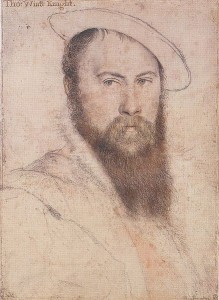
On 5th May 1536, Sir Thomas Wyatt, the Elder, the renowned court poet, and Sir Richard Page, a Gentleman of the Privy Chamber, were arrested and imprsoned in the Tower of London. There were now 8 prisoners in the Tower of London in the coup against the Boleyns: Anne Boleyn, George Boleyn, Mark Smeaton, Sir Henry Norris, Sir Francis Weston, William Brereton, Wyatt and Page.
Also around this time, Sir Francis Bryan was ordered to London by Thomas Cromwell for questioning. He did not join the others in the Tower.
You can read more about Wyatt, Page and Bryan in my articles Circa Regna Tonat – About the Throne the Thunder Rolls and Sir Richard Page and Sir Francis Bryan.